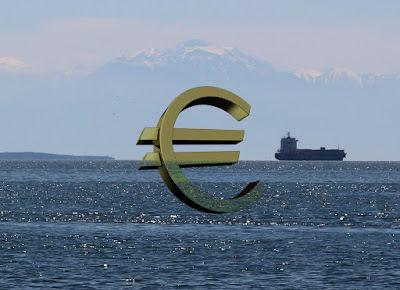Let's keep the Eurozone together. Really?
During the recent negotiations between Greece and its creditors about a debt restructuring programme, we learned that both parties were very keen on maintaining the Eurozone intact (aka Greece staying in the Eurozone). Why is it in their interests to do so? Let's see both sides arguments.
First the Greek argument. The Greeks are going through incredibly harsh times with sky-high unemployment and plummeting income, so it's fair to wonder why they are so keen on staying in the Eurozone. What is so great about the Euro that a country is ready to face the threat of economic collapse to stay in it? Indeed what is happening in Greece now, with all banks being closed, capital controls and cash redrawal close to impossible, is a financial collapse similar to the one the U.S. had feared after Lehman Brothers bankruptcy. With no lending, an economy cannot function properly, companies face liquidity crisis leading to being shut down, people don't invest or rather emigrate and the country faces economic collapse. Of course an exit from the Euro is a better outcome. The introduction of the Euro and a single market has encouraged massive imbalances between countries, which left massive debt once the capital flows were reversed. The citizens of the indebted countries are now paying the price (through increased taxes, unemployment) and are worse off. As we learn in empirical economics, people prefer to smooth out earnings, so going from boom to bust should definitely be ranked as a bad outcome.
Second the European argument. Why does the integrity of the Eurozone matter? In the case of Greece, it's all the more striking as the macro figures with or without this country would look about the same as Greece is a comparatively very small country. One argument is the risk of CONTAGION. The story of contagion goes as follows: if you let one country leave, then the market will speculate on who COULD be the next candidate to be FORCED out, and increase the interest rates of this country's borrowing up to a point where it becomes unsustainable and the country has to leave the monetary union. With a weak economy (though somewhat improving recently), rampant corruption, and excessive public sector, France looks TODAY like the foremost candidate. And a Euro with only one (Germany) out of the three biggest European economies (France, Germany and United Kingdom) wouldn't look very appealing. But does the focus on Greece really takes the heat of the markets off France? In the short term it might because speculation is a short term phenomenon but in the longer term certainly not. If imbalances were growing between increasingly uncompetitive French firms and wealthy Europeans inflating asset prices there (like buying holiday houses) , then a crisis is bound to happen, with or without Greece.
Another closely related argument is to say that expelling one member of the Eurozone would expose flaws in the Eurozone project. The major flaw being that in a monetary union without fiscal union, imbalances between different economies tend to create booms and bust, and because there is no fiscal transfers to compensate for these imbalances, then some countries can end up in non-sustainable fiscal situations (aka go bankrupt or face huge austerity). However this argument is told in the wrong order: the flaws existed before the expelling of one country (and actually caused it). Hence a rescue of Greece will do nothing to address these flaws. Only the development of a political and fiscal union will solve this fundamental problem. In the long term, as the Greeks have discovered very painfully, we are better off without a monetary union than with an incomplete union. It was a mistake to have done a monetary union before a fiscal union.


a very clear analysis of the Geek problems in the Eurozone
ReplyDelete